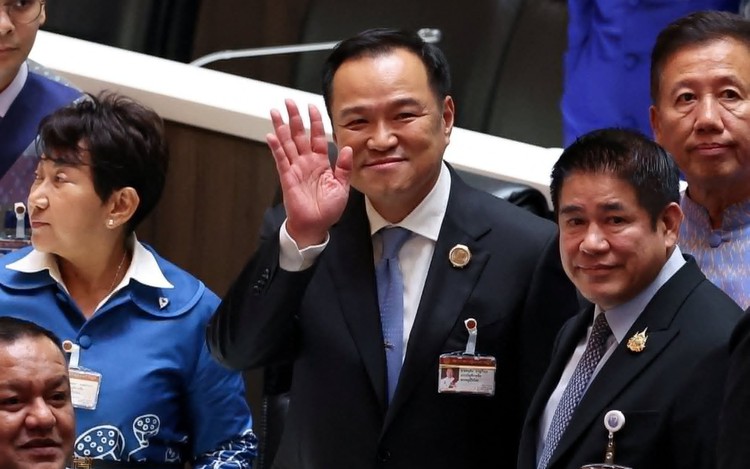
Leader of Bhumjaithai Party, Anutin Charnvirakul, when freshly elected as Thailand’s 32rd PM on August 12, 2025. Photo: Reuters
However, the new government led by Anutin is unlikely to last long due to behind-the-scenes political compromises with a force that had been 'dormant' for over a year but has now awakened: the People's Party (formerly the Move Forward Party).
Friend-turned-foe and foe-turned-friend
The September 5 vote was a strange event in a bizzare legislative term in Thailand.
The election chose the Bhumjaithai Party (69 seats), which holds only the third-largest number of seats in the House of Representatives, as the new ruling party.
The two parties with the most seats -- People's Party (143 seats) and Pheu Thai (132 seats) -- are not participating in the new government, despite each holding approximately double the seats.
This all relates to the strange factor known as the People's Party.
Speaking to Tuoi Tre News, Professor Thitinan Pongsudhirak, director of the Institute of Security and International Studies at Chulalongkorn University in Thailand, explained: "The People's Party has become the kingmaker in the current equation. Thailand has never had a political party like this. It has the highest number of MPs but no prime minister candidate.
"This is because the Move Forward party, as predecessor to the People's Party, won the May 2023 election but was dissolved a year later.
"Its leader Pita Limcharoenrat was banned from politics for ten years."
After the May 2023 election, the Move Forward Party initially allied with Pheu Thai to form a government.
However, Pheu Thai later turned its back, allying with Bhumjaithai and several smaller parties to seize power.
But after former PM Paetongtarn Shinawatra was caught in a leaked recording scandal of a phone call with Cambodian Senate President Hun Sen in June, Bhumjaithai and Anutin announced their withdrawal from this alliance and became Pheu Thai's most dangerous opposition force.
This situation created a 'strange' chess position: neither Pheu Thai nor Bhumjaithai could form a government on their own.
In this context, they both looked to an old rival -- the People's Party.
Whichever party could convince the People's Party to support them would certainly be able to form a government.
"Bhumjaithai and Pheu Thai parties used to be allies but are now arch-rivals," Thitinan commented.
"As long as the conflict between Bhumjaithai and Pheu Thai persists, the People's Party has leverage as kingmaker and can advocate for constitutional reforms."
Reality unfolded exactly according to this scenario.
Anutin won with 311/490 votes, of which 142 votes came from the People's Party.
However, this party made another strange move by continuing not to join the government.
"Normally, Thai political parties want to be in government because that is where money and influence are made," The Chulalongkorn professor analyzed.
"But the People's Party is proving an exception.
"The People's Party has a principled stand for constitutional reforms and the rewriting of the charter."
Two difficult choices
Speaking with Tuoi Tre News, People's Party deputy leader Chaiwat Sathawornwichit clarified the party's position: "We do not support Bhumjaithai. We let its leader to be the next PM on the agreement that they will do mainly 2 things: 1. Referendum that paves the way to constitutional amendments which should take four months; 2. Dissolve the parliament within four months."
Chaiwat affirmed that the People's Party recognizes there are no good options in Thai politics.
However, the party decided not to abstain because it clearly understood that without their votes, no party could form a government.
This situation could push Thailand into deadlock or encourage Pheu Thai and Bhumjaithai to 'reconcile.'
Even the 'old poơers' might return under the guise of restoring order.
"Abstaining is not an acceptable option. So we had to cast a vote," Chaiwat affirmed.
According to the People's Party deputy leader, if they sided with Pheu Thai, the two parties could immediately form a majority government.
In that case, the only mechanism the People's Party would have to monitor Pheu Thai would be through no-confidence debates.
However, even that option would not be effective in this scenario.
Chaiwat explained the decision to choose Bhumjaithai: "It's unlikely they can form a durable government. The red bloc can trigger a no-confidence vote at any time to lead to dissolution. Or if we see a sign of breaching the agreement that the Bhumjaithai Party promised to the people, which is to pave the way for constitutional amendments and dissolve the parliament within four months, we can trigger a no-confidence vote."
The People's Party deputy leader stated that with the scenario of voting for Bhumjaithai, the People's Party maintains its position as a swing vote and keeps the door for parliamentary dissolution open.
Will People's Party win big?
Professor Thitinan asserted that the People's Party will win convincingly in the upcoming general election.
He noted that in the 2023 election, the party won 151/500 seats.
In the next election, this number could increase to 200 or more.
"A reckoning will then take place if the People's Party is dissolved again," he predicted.
"Its electoral base and the broad Thai electorate might not put up with yet another manipulation and subversion and thereby rise up in protest.
"But if they do put up with another party dissolution and ban on party leaders, then Thailand will be under a ruling system that does not deliver and lead to more decay and stagnation."


Max: 1500 characters
There are no comments yet. Be the first to comment.